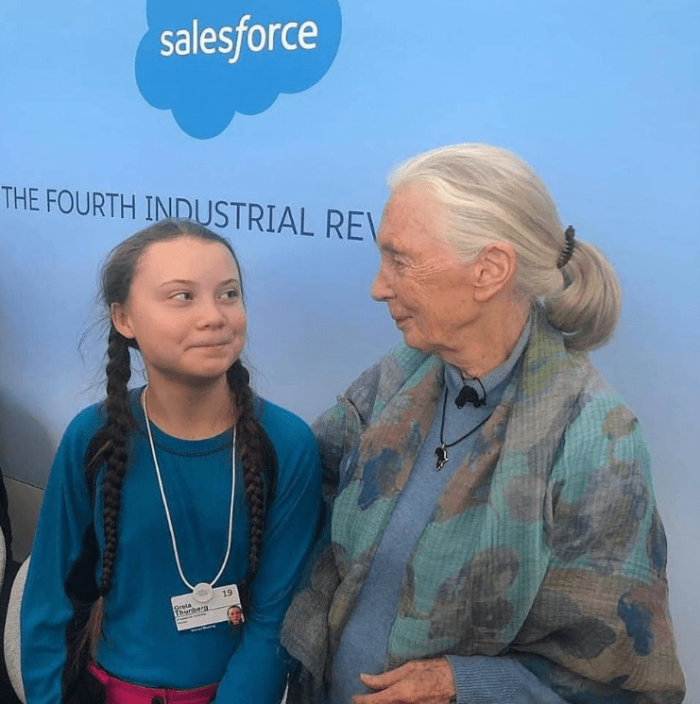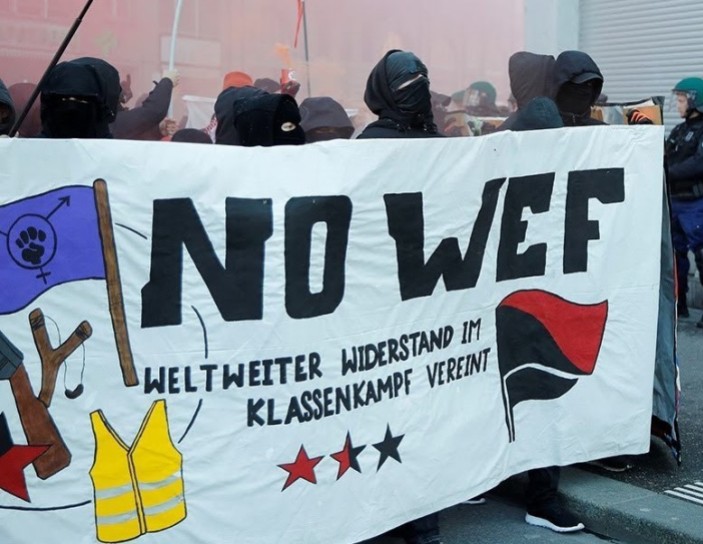Oct 14
20200
Rockefeller Foundation, Social Engineering
Behavioural Change Build Back Better Education Emerging Markets Fourth Industrial Revolution Global Goals Great Reset Klaus Shwab Marketing Social Enginnering Social License Sustainable Development Goals (SDGs) Thrive United Nations World Economic Forum
Klaus Schwab and His Great Fascist Reset – An Overview
October 5, 2020
This exemplary overview is written by Paul Cudenec, who I work with on the No Deal For Nature campaign – an effort to educate the citizenry (in order to stop) the coming enclosure and financialization of nature, global in scale. (Created by the World Economic Forum in partnership with the United Nations, World Wildlife Fund and Gore’s Climate Reality Project, legislation is now slated for 2021). “Ecosystem Services” will be bought, sold and traded on Wall Street. GDP replaced by “Natural Capital Accounting”. Those that have destroyed the planet’s biodiversity, will now own what remains. Including the oceans. The enclosure of the commons will further displace Indigenous Peoples. An acceleration of an ongoing genocide. Following the full commodification/privatization of nature, the financialization of social and human will follow. This is part of the new “global governance” infrastructure underpinning the fourth industrial revolution, being rolled out to the global citizenry as the “great reset”. COVID-19 is the catalyst. [Follow No Deal For Nature on twitter] [No Deal For Nature UK Website]
Packaged in holistic linguistics, key buzzwords (thrive, thriving, imagine, imagination, reimagine, build back better), new deals, and emotive imagery, those serving capital and current power structures have been tasked with building and obtaining the social license required.
But what exactly is the vision? Here, Paul takes you on a journey, using direct quotes from Klaus Schwab, from his recent books including “COVID-19, The Great Reset”. Both riveting – and terrifying, due to the depraved ideologies and goals described within, I suggest people find a quiet place, to read every word of this overview. Please share in broader circles.
Born in Ravensburg in 1938, Klaus Schwab is a child of Adolf Hitler’s Germany, a police-state regime built on fear and violence, on brainwashing and control, on propaganda and lies, on industrialism and eugenics, on dehumanisation and “disinfection”, on a chilling and grandiose vision of a “new order” that would last a thousand years.
Schwab seems to have dedicated his life to reinventing that nightmare and to trying to turn it into a reality not just for Germany but for the whole world.
Worse still, as his own words confirm time and time again, his technocratic fascist vision is also a twisted transhumanist one, which will merge humans with machines in “curious mixes of digital-and-analog life”, which will infect our bodies with “Smart Dust” and in which the police will apparently be able to read our brains.
And, as we will see, he and his accomplices are using the Covid-19 crisis to bypass democratic accountability, to override opposition, to accelerate their agenda and to impose it on the rest of humankind against our will in what he terms a “Great Reset“.
Schwab is not, of course, a Nazi in the classic sense, being neither a nationalist nor an anti-semite, as testified by the $1 million Dan David Prize he was awarded by Israel in 2004.
But 21st century fascism has found different political forms through which to continue its core project of reshaping humanity to suit capitalism through blatantly authoritarian means.
This new fascism is today being advanced in the guise of global governance, biosecurity, the “New Normal”, the “New Deal for Nature” and the “Fourth Industrial Revolution”.
Schwab, the octogenarian founder and executive chairman of the World Economic Forum, sits at the centre of this matrix like a spider on a giant web.
The original fascist project, in Italy and Germany, was all about a merger of state and business.
While communism envisages the take-over of business and industry by the government, which – theoretically! – acts in the interests of the people, fascism was all about using the state to protect and advance the interests of the wealthy elite.
Schwab was continuing this approach in a denazified post-WW2 context, when in 1971 he founded the European Management Forum, which held annual meetings at Davos in Switzerland.
Here he promoted his ideology of “stakeholder” capitalism in which businesses were brought into closer co-operation with government.
“Stakeholder capitalism” is described by Forbes business magazine as “the notion that a firm focuses on meeting the needs of all its stakeholders: customers, employees, partners, the community, and society as a whole”.
Even in the context of a particular business, it is invariably an empty label. As the Forbes article notes, it actually only means that “firms can go on privately shoveling money to their shareholders and executives, while maintaining a public front of exquisite social sensitivity and exemplary altruism”.
But in a general social context, the stakeholder concept is even more nefarious, discarding any idea of democracy, rule by the people, in favour of rule by corporate interests.
Society is no longer regarded as a living community but as a business, whose profitability is the sole valid aim of human activity.
Schwab set out this agenda back in 1971, in his book Moderne Unternehmensführung im Maschinenbau (Modern Enterprise Management in Mechanical Engineering), where his use of the term “stakeholders” (die Interessenten) effectively redefined human beings not as citizens, free individuals or members of communities, but as secondary participants in a massive commercial enterprise.
The aim of each and every person’s life was “to achieve long-term growth and prosperity” for this enterprise – in other words, to protect and increase the wealth of the capitalist elite.
This all became even clearer in 1987, when Schwab renamed his European Management Forum the World Economic Forum.
The WEF describes itself on its own website as “the global platform for public-private cooperation”, with admirers describing how it creates “partnerships between businessmen, politicians, intellectuals and other leaders of society to ‘define, discuss and advance key issues on the global agenda’.”
The “partnerships” which the WEF creates are aimed at replacing democracy with a global leadership of hand-picked and unelected individuals whose duty is not to serve the public, but to impose the rule of the 1% on that public with as little interference from the rest of us as possible.
In the books Schwab writes for public consumption, he expresses himself in the two-faced clichés of corporate spin and greenwashing.
The same empty terms are dished up time and time again. In Shaping the Future of the Fourth Industrial Revolution: A Guide to Building a Better World Schwab talks of “the inclusion of stakeholders and the distribution of benefits” and of “sustainable and inclusive partnerships” which will lead us all to an “inclusive, sustainable and prosperous future”! (1)
Behind this bluster, the real motivation driving his “stakeholder capitalism”, which he was still relentlessly promoting at the WEF’s 2020 Davos conference, is profit and exploitation.
For instance, in his 2016 book The Fourth Industrial Revolution, Schwab writes about the Uberisation of work and the consequent advantages for companies, particularly fast-growing start-ups in the digital economy: “As human cloud platforms classify workers as self-employed, they are—for the moment—free of the requirement to pay minimum wages, employer taxes and social benefits”. (2)
The same capitalist callousness shines through in his attitude towards people nearing the end of their working lives and in need of a well-deserved rest: “Aging is an economic challenge because unless retirement ages are drastically increased so that older members of society can continue to contribute to the workforce (an economic imperative that has many economic benefits), the working-age population falls at the same time as the percentage of dependent elders increases”. (3)
Everything in this world is reduced to economic challenges, economic imperatives and economic benefits for the ruling capitalist class.
The myth of Progress has long been used by the 1% to persuade people to accept the technologies designed to exploit and control us and Schwab plays on this when he declares that “the Fourth Industrial Revolution represents a significant source of hope for continuing the climb in human development that has resulted in dramatic increases in quality of life for billions of people since 1800”. (4)
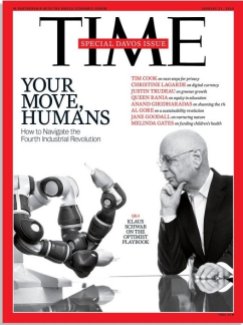
But he is well aware that technology is not ideologically neutral, as some like to claim. Technologies and societies shape each other, he says. “After all, technologies are tied up in how we know things, how we make decisions, and how we think about ourselves and each other. They are connected to our identities, worldviews and potential futures. From nuclear technologies to the space race, smartphones, social media, cars, medicine and infrastructure—the meaning of technologies makes them political. Even the concept of a ‘developed’ nation implicitly rests on the adoption of technologies and what they mean for us, economically and socially”. (6)
Technology, for the capitalists behind it, has never been about social good but purely about profit, and Schwab makes it quite clear that the same remains true of his Fourth Industrial Revolution.
He enthuses: “Fourth Industrial Revolution technologies are truly disruptive—they upend existing ways of sensing, calculating, organizing, acting and delivering. They represent entirely new ways of creating value for organizations and citizens”. (7)
In case the meaning of “creating value” was not clear, he gives some examples: “Drones represent a new type of cost-cutting employee working among us and performing jobs that once involved real people” (8) and “the use of ever-smarter algorithms is rapidly extending employee productivity—for example, in the use of chat bots to augment (and, increasingly, replace) ‘live chat’ support for customer interactions”. (9)
Schwab goes into some detail about the cost-cutting, profit-boosting marvels of his brave new world in The Fourth Industrial Revolution.
He explains: “Sooner than most anticipate, the work of professions as different as lawyers, financial analysts, doctors, journalists, accountants, insurance underwriters or librarians may be partly or completely automated…
“The technology is progressing so fast that Kristian Hammond, cofounder of Narrative Science, a company specializing in automated narrative generation, forecasts that by the mid-2020s, 90% of news could be generated by an algorithm, most of it without any kind of human intervention (apart from the design of the algorithm, of course)”. (10)
It is this economic imperative that informs Schwab’s enthusiasm for “a revolution that is fundamentally changing the way we live, work, and relate to one another”. (11)
Schwab waxes lyrical about the 4IR, which he insists is “unlike anything humankind has experienced before”. (12)
He gushes: “Consider the unlimited possibilities of having billions of people connected by mobile devices, giving rise to unprecedented processing power, storage capabilities and knowledge access. Or think about the staggering confluence of emerging technology breakthroughs, covering wide-ranging fields such as artificial intelligence (AI), robotics, the internet of things (IoT), autonomous vehicles, 3D printing, nanotechnology, biotechnology, materials science, energy storage and quantum computing, to name a few. Many of these innovations are in their infancy, but they are already reaching an inflection point in their development as they build on and amplify each other in a fusion of technologies across the physical, digital and biological worlds”. (13)
He also looks forward to more online education, involving “the use of virtual and augmented reality” to “dramatically improve educational outcomes” (14), to sensors “installed in homes, clothes and accessories, cities, transport and energy networks” (15) and to smart cities, with their all-important “data platforms”. (16)
“All things will be smart and connected to the internet”, says Schwab, and this will extend to animals, as “sensors wired in cattle can communicate to each other through a mobile phone network”. (17)
He loves the idea of “smart cell factories” which could enable “the accelerated generation of vaccines” (18) and “big-data technologies”. (19)
These, he ensures us, will “deliver new and innovative ways to service citizens and customers” (20) and we will have to stop objecting to businesses profiting from harnessing and selling information about every aspect of our personal lives.
“Establishing trust in the data and algorithms used to make decisions will be vital,” insists Schwab. “Citizen concerns over privacy and establishing accountability in business and legal structures will require adjustments in thinking”. (21)
At the end of the day it is clear that all this technological excitement revolves purely around profit, or “value” as Schwab prefers to term it in his 21st century corporate newspeak.
Thus blockchain technology will be fantastic and provoke “an explosion in tradable assets, as all kinds of value exchange can be hosted on the blockchain”. (22)
The use of distributed ledger technology, adds Schwab, “could be the driving force behind massive flows of value in digital products and services, providing secure digital identities that can make new markets accessible to anyone connected to the internet”. (23)
In general, the interest of the 4IR for the ruling business elite is that it will “create entirely new sources of value” (24) and “give rise to ecosystems of value creation that are impossible to imagine with a mindset stuck in the third Industrial Revolution”. (25)
The technologies of the 4IR, rolled out via 5G, pose unprecedented threats to our freedom, as Schwab concedes: “The tools of the fourth industrial revolution enable new forms of surveillance and other means of control that run counter to healthy, open societies”. (26)
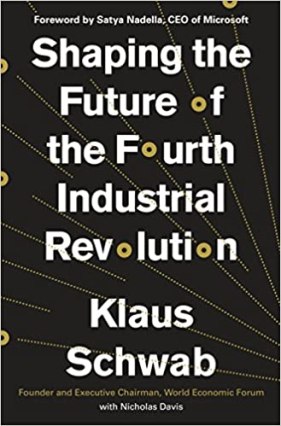
He describes with some relish how these technologies “can intrude into the hitherto private space of our minds, reading our thoughts and influencing our behavior”. (28)
Schwab predicts: “As capabilities in this area improve, the temptation for law enforcement agencies and courts to use techniques to determine the likelihood of criminal activity, assess guilt or even possibly retrieve memories directly from people’s brains will increase. Even crossing a national border might one day involve a detailed brain scan to assess an individual’s security risk”. (29)
There are times when the WEF chief gets carried away by his passion for a sci-fi future in which “long-distance human space travel and nuclear fusion are commonplace” (30) and in which “the next trending business model” might involve someone “trading access to his or her thoughts for the time-saving option of typing a social media post by thought alone”. (31)
Talk of “space tourism” under the title “The Fourth Industrial Revolution and the final frontier” (32) is almost funny, as is his suggestion that “a world full of drones offers a world full of possibilities”. (33)
But the further the reader progresses into the world depicted in Schwab’s books, the less of a laughing matter it all seems.
The truth is that this highly influential figure, at the centre of the new global order currently being established, is an out-and-out transhumanist who dreams of an end to natural healthy human life and community.
Schwab repeats this message time and time again, as if to be sure we have been duly warned.
“The mind-boggling innovations triggered by the fourth industrial revolution, from biotechnology to AI, are redefining what it means to be human,” (34) he writes.
“The future will challenge our understanding of what it means to be human, from both a biological and a social standpoint”. (35)
“Already, advances in neurotechnologies and biotechnologies are forcing us to question what it means to be human”. (36)
He spells it out in more detail in Shaping the Future of the Fourth Industrial Revolution: “Fourth Industrial Revolution technologies will not stop at becoming part of the physical world around us—they will become part of us. Indeed, some of us already feel that our smartphones have become an extension of ourselves. Today’s external devices—from wearable computers to virtual reality headsets—will almost certainly become implantable in our bodies and brains. Exoskeletons and prosthetics will increase our physical power, while advances in neurotechnology enhance our cognitive abilities. We will become better able to manipulate our own genes, and those of our children. These developments raise profound questions: Where do we draw the line between human and machine? What does it mean to be human?” (37)
A whole section of this book is devoted to the theme “Altering the Human Being”. Here he drools over “the ability of new technologies to literally become part of us” and invokes a cyborg future involving “curious mixes of digital-and-analog life that will redefine our very natures”. (38)
He writes: “These technologies will operate within our own biology and change how we interface with the world. They are capable of crossing the boundaries of body and mind, enhancing our physical abilities, and even having a lasting impact on life itself “. (39)
No violation seems to go too far for Schwab, who dreams of “active implantable microchips that break the skin barrier of our bodies”, “smart tattoos”, “biological computing” and “custom-designed organisms”. (40)
He is delighted to report that “sensors, memory switches and circuits can be encoded in common human gut bacteria”, (41) that “Smart Dust, arrays of full computers with antennas, each much smaller than a grain of sand, can now organize themselves inside the body” and that “implanted devices will likely also help to communicate thoughts normally expressed verbally through a ‘built-in’ smartphone, and potentially unexpressed thoughts or moods by reading brain waves and other signals”. (42)
“Synthetic biology” is on the horizon in Schwab’s 4IR world, giving the technocratic capitalist rulers of the world “the ability to customize organisms by writing DNA”. (43)
The idea of neurotechnologies, in which humans will have fully artificial memories implanted in the brain, is enough to make some of us feel faintly sick, as is “the prospect of connecting our brains to VR through cortical modems, implants or nanobots”. (44)
It is of little comfort to learn that this is all – of course! – in the greater interests of capitalist profiteering since it “heralds new industries and systems for value creation” and “represents an opportunity to create entire new systems of value in the Fourth Industrial Revolution”. (45)
And what about “the bioprinting of organic tissues” (46) or the suggestion that “animals could potentially be engineered to produce pharmaceuticals and other forms of treatment”? (47)
Ethical objections, anyone?
It’s all evidently good for Schwab, who is happy to announce: “The day when cows are engineered to produce in its [sic] milk a blood-clotting element, which hemophiliacs lack, is not far off. Researchers have already started to engineer the genomes of pigs with the goal of growing organs suitable for human transplantation”. (48)
It gets even more disturbing. Ever since the sinister eugenics programme of the Nazi Germany into which Schwab was born, this science has been deemed beyond the pale by human society.
But now, however, he evidently feels eugenics is due a revival, announcing with regard to genetic editing: “That it is now far easier to manipulate with precision the human genome within viable embryos means that we are likely to see the advent of designer babies in the future who possess particular traits or who are resistant to a specific disease”. (49)
In the notorious 2002 transhumanist treatise I, Cyborg, Kevin Warwick predicts: “Humans will be able to evolve by harnessing the super-intelligence and extra abilities offered by the machines of the future, by joining with them. All this points to the development of a new human species, known in the science-fiction world as ‘cyborgs’. It doesn’t mean that everyone has to become a cyborg. If you are happy with your state as a human then so be it, you can remain as you are. But be warned – just as we humans split from our chimpanzee cousins years ago, so cyborgs will split from humans. Those who remain as humans are likely to become a sub-species. They will, effectively, be the chimpanzees of the future”. (50)
Schwab seems to be hinting at the same future of a “superior” enhanced artificial transhuman elite separating from the natural-born rabble, in this particularly damning passage from The Fourth Industrial Revolution: “We are at the threshold of a radical systemic change that requires human beings to adapt continuously. As a result, we may witness an increasing degree of polarization in the world, marked by those who embrace change versus those who resist it.
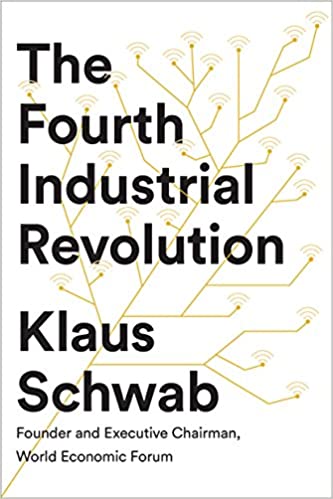
Schwab was already talking about a “great transformation” back in 2016 (52) and is clearly determined to do everything in his not inconsiderable power to bring about his eugenics-inspired transhumanist world of artifice, surveillance, control and exponential profit.
But, as revealed by his reference above to “class conflicts”, he is clearly worried by the possibility of “societal resistance” (53) and how to advance “if technologies receive a great deal of resistance from the public”. (54)
Schwab’s annual WEF shindigs at Davos have long been met by anti-capitalist protests and, despite the current paralysis of the radical left, he is well aware of the possibility of renewed and perhaps broader opposition to his project, with the risk of “resentment, fear and political backlash”. (55)
In his most recent book he provides a historical context, noting that “antiglobalization was strong in the run-up to 1914 and up to 1918, then less so during the 1920s, but it reignited in the 1930s as a result of the Great Depression”. (56)
He notes that in the early 2000s “the political and societal backlash against globalization relentlessly gained strength”, (57) says that “social unrest” has been widespread across the world in the past two years, citing the Gilets Jaunes in France among other movements, and invokes the “sombre scenario” that “the same could happen again”. (58)
So how is an honest technocrat supposed to roll out his preferred future for the world without the agreement of the global public? How can Schwab and his billionaire friends impose their favoured society on the rest of us?
One answer is relentless brainwashing propaganda churned out by the mass media and academia owned by the 1% elite – what they like to call “a narrative”.
For Schwab, the reluctance of the majority of humankind to leap aboard his 4IR express reflects the tragedy that “the world lacks a consistent, positive and common narrative that outlines the opportunities and challenges of the fourth industrial revolution, a narrative that is essential if we are to empower a diverse set of individuals and communities and avoid a popular backlash against the fundamental changes under way”. (59)
He adds: “It is, therefore, critical that we invest attention and energy in multistakeholder cooperation across academic, social, political, national and industry boundaries. These interactions and collaborations are needed to create positive, common and hope-filled narratives, enabling individuals and groups from all parts of the world to participate in, and benefit from, the ongoing transformations”. (60)
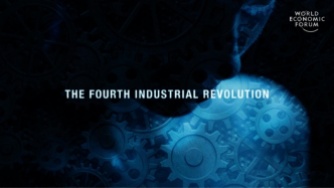
Schwab is frustrated that “more than half of the world’s population—around 3.9 billion people—still cannot access the internet”, (61) with 85% of the population of developing countries remaining offline and therefore out of reach, as compared to 22% in the developed world.
The actual aim of the 4IR is to exploit these populations for profit via global techno-imperialism, but of course that cannot be stated in the propaganda “narrative” required to sell the plan.
Instead, their mission has to be presented, as Schwab himself does, as a bid to “develop technologies and systems that serve to distribute economic and social values such as income, opportunity and liberty to all stakeholders”. (62)
He piously postures as a guardian of woke liberal values, declaring: “Thinking inclusively goes beyond thinking about poverty or marginalized communities simply as an aberration—something that we can solve. It forces us to realize that ‘our privileges are located on the same map as their suffering’. It moves beyond income and entitlements, though these remain important. Instead, the inclusion of stakeholders and the distribution of benefits expand freedoms for all”. (63)
The same technique, of a fake “narrative” designed to fool good-thinking citizens into supporting an imperialist capitalist scheme, has been used extensively with regard to climate change.
Schwab is a great fan of Greta Thunberg, of course, who had barely stood up from the pavement after her one-girl protest in Stockholm before being whisked off to address the WEF at Davos.
He is also a supporter of the proposed global New Deal for Nature, particularly via Voice for the Planet, which was launched at the WEF in Davos in 2019 by the Global Shapers, a youth-grooming organisation created by Schwab in 2011 and aptly described by investigative journalist Cory Morningstar as “a grotesque display of corporate malfeasance disguised as good”.
In his 2020 book, Schwab actually lays out the way that fake “youth activism” is being used to advance his capitalist aims.
He writes, in a remarkably frank passage: “Youth activism is increasing worldwide, being revolutionized by social media that increases mobilization to an extent that would have been impossible before. It takes many different forms, ranging from non-institutionalized political participation to demonstrations and protests, and addresses issues as diverse as climate change, economic reforms, gender equality and LGBTQ rights. The young generation is firmly at the vanguard of social change. There is little doubt that it will be the catalyst for change and a source of critical momentum for the Great Reset”. (64)
In fact, of course, the ultra-industrial future proposed by Schwab is anything other than green. It’s not nature he’s interested in, but “natural capital” and “incentivizing investment in green and social frontier markets”. (65)
Pollution means profit and environmental crisis is just another business opportunity, as he details in The Fourth Industrial Revolution: “In this revolutionary new industrial system, carbon dioxide turns from a greenhouse pollutant into an asset, and the economics of carbon capture and storage move from being cost as well as pollution sinks to becoming profitable carbon-capture and use-production facilities. Even more important, it will help companies, governments and citizens become more aware of and engaged with strategies to actively regenerate natural capital, allowing intelligent and regenerative uses of natural capital to guide sustainable production and consumption and give space for biodiversity to recover in threatened areas”. (66)
Schwab’s “solutions” to the heart-breaking damage inflicted on our natural world by industrial capitalism involve more of the same poison, except worse.
Geoengineering is one of his favourites: “Proposals include installing giant mirrors in the stratosphere to deflect the sun’s rays, chemically seeding the atmosphere to increase rainfall and the deployment of large machines to remove carbon dioxide from the air”. (67)
And he adds: “New approaches are currently being imagined through the combination of Fourth Industrial Revolution technologies, such as nanoparticles and other advanced materials”. (68)
Like all the businesses and pro-capitalist NGOs backing the threatened New Deal for Nature, Schwab is utterly and profoundly ungreen.
For him, the “ultimate possibility” of “clean” and “sustainable” energy includes nuclear fusion (69) and he looks forward to the day when satellites will “blanket the planet with communications pathways that could help connect the more than 4 billion people still lacking online access”. (70)
Schwab also very much regrets all that red tape preventing the unhindered onward march of GM food, warning that “global food security will only be achieved, however, if regulations on genetically modified foods are adapted to reflect the reality that gene editing offers a precise, efficient and safe method of improving crops”. (71)
The new order envisaged by Schwab will embrace the entire world and so global governance is required in order to impose it, as he repeatedly states.
His preferred future “will only come about through improved global governance” (72) he insists. “Some form of effective global governance” (73) is needed.
The problem we have today is that of a possible “global order deficit”, (74) he claims, adding improbably that the World Health Organization “is saddled with limited and dwindling resources”. (75)
What he is really saying is that his 4IR/great reset society will only function if imposed simultaneously everywhere on the planet, otherwise “we will become paralysed in our attempts to address and respond to global challenges”. (76)
He admits: “In a nutshell, global governance is at the nexus of all these other issues”. (77)
This all-englobing empire very much frowns on the idea of any particular population democratically deciding to take another path. These “risk becoming isolated from global norms, putting these nations at risk of becoming the laggards of the new digital economy”, (78) warns Schwab.
Any sense of autonomy and grassroots belonging is regarded as a threat from Schwab’s imperialist perspective and is due to be eradicated under the 4IR.
He writes: “Individuals used to identify their lives most closely with a place, an ethnic group, a particular culture or even a language. The advent of online engagement and increased exposure to ideas from other cultures means that identities are now more fungible than previously… Thanks to the combination of historical migration patterns and low-cost connectivity, family structures are being redefined”. (79)
Genuine democracy essentially falls into the same category for Schwab. He knows that most people will not willingly go along with plans to destroy their lives and enslave them to a global techno-fascist system of exploitation, so giving them a say in the matter is simply not an option.
This is why the “stakeholder” concept has been so important for Schwab’s project. As discussed above, this is the negation of democracy, with its emphasis instead on “reaching out across stakeholder groups for solution building”. (80)
If the public, the people, are included in this process it is only at a superficial level. The agenda has already been pre-supposed and the decisions pre-made behind the scenes.
Schwab effectively admits as much when he writes: “We must re-establish a dialogue among all stakeholders to ensure mutual understanding that further builds a culture of trust among regulators, non-governmental organizations, professionals and scientists. The public must also be considered, because it must participate in the democratic shaping of biotechnological developments that affect society, individuals and cultures”. (81)
So the public must “also” be considered, as an afterthought. Not even directly consulted, just “considered”! And the role of the people, the demos, will merely be to “participate” in the “shaping” of biotechnological developments. The possibility of the public actually rejecting the very idea of biotechnological developments has been entirely removed thanks to the deliberately in-built assumptions of the stakeholder formula.
The same message is implied in the heading of Schwab’s conclusion to Shaping the Future of the Fourth Industrial Revolution: “What You Can Do to Shape the Fourth Industrial Revolution”. (82) The techno-tyranny cannot challenged or stopped, merely “shaped”.
Schwab uses the term “systems leadership” to describe the profoundly anti-democratic way in which the 1% imposes its agenda on us all, without giving us the chance to say ‘no’.
He writes: “Systems leadership is about cultivating a shared vision for change—working together with all stakeholders of global society—and then acting on it to change how the system delivers its benefits, and to whom. Systems leadership requires action from all stakeholders, including individuals, business executives, social influencers and policy-makers”. (83)
He refers to this full-spectrum top-down control as “the system management of human existence” (84) although others might prefer the term “totalitarianism”.
One of the distinguishing features of historical fascism in Italy and Germany was its impatience with the inconvenient restraints imposed on the ruling class (“the Nation” in fascist language) by democracy and political liberalism.
All of this had to be swept out of the way to allow a Blitzkrieg of accelerated “modernisation”.
We see the same spirit resurging in Schwab’s calls for “agile governance” in which he claims that “the pace of technological development and a number of characteristics of technologies render previous policy-making cycles and processes inadequate”. (85)
He writes: “The idea of reforming governance models to cope with new technologies is not new, but the urgency of doing so is far greater in light of the power of today’s emerging technologies… the concept of agile governance seeks to match the nimbleness, fluidity, flexibility and adaptiveness of the technologies themselves and the private-sector actors adopting them”. (86)
The phrase “reforming governance models to cope with new technologies” really gives the game away here. As under fascism, social structures must be reinvented so as to accommodate the requirements of capitalism and its profit-increasing technologies.
Schwab explains that his “agile governance” would involve creating so-called policy labs – “protected spaces within government with an explicit mandate to experiment with new methods of policy development by using agile principles” – and “encouraging collaborations between governments and businesses to create ‘developtory sandboxes’ and ‘experimental testbeds’ to develop regulations using iterative, cross-sectoral and flexible approaches”. (87)
For Schwab, the role of the state is to advance capitalist aims, not to hold them up to any form of scrutiny. While he is all in favour of the state’s role in enabling a corporate take-over of our lives, he is less keen about its regulatory function, which might slow down the inflow of profit into private hands, and so he envisages “the development of ecosystems of private regulators, competing in markets”. (88)
In his 2018 book, Schwab discusses the problem of pesky regulations and how best to “overcome these limits” in the context of data and privacy.
He comes up with the suggestion of “public-private data-sharing agreements that ‘break glass in case of emergency’. These come into play only under pre-agreed emergency circumstances (such as a pandemic) and can help reduce delays and improve the coordination of first responders, temporarily allowing data sharing that would be illegal under normal circumstances”. (89)
Funnily enough, two years later there was indeed a “pandemic” and these “pre-agreed emergency circumstances” became a reality.
This shouldn’t have been too much of a surprise for Schwab, since his WEF had co-hosted the infamous Event 201 conference in October 2019, which modelled a fictional coronavirus pandemic.
And he wasted little time in bringing out a new book, Covid-19: The Great Reset, co-authored with Thierry Malleret, who runs something called the Monthly Barometer, “a succinct predictive analysis provided to private investors, global CEOs and opinion- and decision-makers”. (90)
Published in July 2020, the book sets out to advance “conjectures and ideas about what the post-pandemic world might, and perhaps should, look like”. (91)
Schwab and Malleret admit that Covid-19 is “one of the least deadly pandemics the world has experienced over the last 2000 years”, adding that “the consequences of COVID-19 in terms of health and mortality will be mild compared to previous pandemics”. (92)
They add: “It does not constitute an existential threat, or a shock that will leave its imprint on the world’s population for decades”. (93)
Yet, incredibly, this “mild” illness is simultaneously presented as the excuse for unprecedented social change under the banner of “The Great Reset”!
And although they explicitly declare that Covid-19 does not constitute a major “shock”, the authors repeatedly deploy the same term to describe the broader impact of the crisis.
Schwab and Malleret place Covid-19 in a long tradition of events which have facilitated sudden and significant changes to our societies.
They specifically invoke the Second World War: “World War II was the quintessential transformational war, triggering not only fundamental changes to the global order and the global economy, but also entailing radical shifts in social attitudes and beliefs that eventually paved the way for radically new policies and social contract provisions (like women joining the workforce before becoming voters). There are obviously fundamental dissimilarities between a pandemic and a war (that we will consider in some detail in the following pages), but the magnitude of their transformative power is comparable. Both have the potential to be a transformative crisis of previously unimaginable proportions”. (94)
They also join many contemporary “conspiracy theorists” in making a direct comparison between Covid-19 and 9/11: “This is what happened after the terrorist attacks of 11 September 2001. All around the world, new security measures like employing widespread cameras, requiring electronic ID cards and logging employees or visitors in and out became the norm. At that time, these measures were deemed extreme, but today they are used everywhere and considered ‘normal’”. (95)
When any tyrant declares the right to rule over a population without taking their views into account, they like to justify their dictatorship with the claim that they are morally entitled to do so because they are “enlightened”.
The same is true of the Covid-fuelled tyranny of Schwab’s great reset, which the book categorises as “enlightened leadership”, adding: “Some leaders and decision-makers who were already at the forefront of the fight against climate change may want to take advantage of the shock inflicted by the pandemic to implement long-lasting and wider environmental changes. They will, in effect, make ‘good use’ of the pandemic by not letting the crisis go to waste”. (96)
The global capitalist ruling elite have certainly been doing their best to “take advantage of the shock inflicted by the panic”, assuring us all since the very earliest days of the outbreak that, for some unfathomable reason, nothing in our lives could ever be the same again.
Schwab and Malleret are, inevitably, enthusiastic in their use of the New Normal framing, despite their admission that the virus was only ever “mild”.
“It is our defining moment”, they crow. “Many things will change forever”. “A new world will emerge”. “The societal upheaval unleashed by COVID-19 will last for years, and possibly generations”. “Many of us are pondering when things will return to normal. The short response is: never”. (97)
They even go as far as proposing a new historical separation between “the pre-pandemic era” and “the post-pandemic world”. (98)
They write: “Radical changes of such consequence are coming that some pundits have referred to a ‘before coronavirus’ (BC) and ‘after coronavirus’ (AC) era. We will continue to be surprised by both the rapidity and unexpected nature of these changes – as they conflate with each other, they will provoke second-, third-, fourth- and more-order consequences, cascading effects and unforeseen outcomes. In so doing, they will shape a ‘new normal’ radically different from the one we will be progressively leaving behind. Many of our beliefs and assumptions about what the world could or should look like will be shattered in the process”. (99)
Back in 2016, Schwab was looking ahead to “new ways of using technology to change behavior” (100) and predicting: “The scale and breadth of the unfolding technological revolution will usher in economic, social and cultural changes of such phenomenal proportions that they are almost impossible to envisage”. (101)
One way in which he had hoped his technocratic agenda would be advanced was, as we have noted, through the phoney “solutions” to climate change proposed by fake green capitalists.
Under the title “environmental reset”, Schwab and Malleret state: “At first glance, the pandemic and the environment might seem to be only distantly related cousins; but they are much closer and more intertwined than we think”. (102)
One of the connections is that both the climate and virus “crises” have been used by the WEF and their like to push their agenda of global governance. As Schwab and his co-author put it, “they are global in nature and therefore can only be properly addressed in a globally coordinated fashion”. (103)
Another link is the way that the “the post-pandemic economy” and “the green economy” (104) involve massive profits for largely the same sectors of big business.
Covid-19 has evidently been great news for those capitalists hoping to cash in on environmental destruction, with Schwab and Malleret reporting: “The conviction that ESG strategies benefited from the pandemic and are most likely to benefit further is corroborated by various surveys and reports. Early data shows that the sustainability sector outperformed conventional funds during the first quarter of 2020”. (105)
The capitalist sharks of the so-called “sustainability sector” are rubbing their hands together with glee at the prospect of all the money they stand to make from the Covid-pretexted great fascist reset, in which the state is instrumentalised to fund their hypocritical profiteering.
Note Schwab and Malleret: “The key to crowding private capital into new sources of nature-positive economic value will be to shift key policy levers and public finance incentives as part of a wider economic reset”. (106)
“A policy paper prepared by Systemiq in collaboration with the World Economic Forum estimates that building the nature-positive economy could represent more than $10 trillion per year by 2030… Resetting the environment should not be seen as a cost, but rather as an investment that will generate economic activity and employment opportunities”. (107)
Given the intertwining of climate and Covid crises set out by Schwab, we might speculate that the original plan was to push through the New Normal reset on the back of the climate crisis.
But evidently, all that publicity for Greta Thunberg and big business-backed Extinction Rebellion did not whip up enough public panic to justify such measures.
Covid-19 serves Schwab’s purposes perfectly, as the immediate urgency it presents allows the whole process to be speeded up and rushed through without due scrutiny.
“This crucial difference between the respective time-horizons of a pandemic and that of climate change and nature loss means that a pandemic risk requires immediate action that will be followed by a rapid result, while climate change and nature loss also require immediate action, but the result (or ‘future reward’, in the jargon of economists) will only follow with a certain time lag”. (108)
For Schwab and his friends, Covid-19 is the great accelerator of everything they have been wanting to foist upon us for years.
As he and Malleret say: “The pandemic is clearly exacerbating and accelerating geopolitical trends that were already apparent before the crisis erupted”. (109)
“The pandemic will mark a turning point by accelerating this transition. It has crystallized the issue and made a return to the pre-pandemic status quo impossible”. (110)
They can barely conceal their delight at the direction society is now taking: “The pandemic will accelerate innovation even more, catalysing technological changes already under way (comparable to the exacerbation effect it has had on other underlying global and domestic issues) and ‘turbocharging’ any digital business or the digital dimension of any business”. (111)
“With the pandemic, the ‘digital transformation’ that so many analysts have been referring to for years, without being exactly sure what it meant, has found its catalyst. One major effect of confinement will be the expansion and progression of the digital world in a decisive and often permanent manner.
“In April 2020, several tech leaders observed how quickly and radically the necessities created by the health crisis had precipitated the adoption of a wide range of technologies. In the space of just one month, it appeared that many companies in terms of tech take-up fast-forwarded by several years”. (112)
Fate is obviously smiling on Klaus Schwab as this Covid-19 crisis has, happily, succeeded in advancing pretty much every aspect of the agenda he has been promoting over the decades.
Thus he and Malleret report with satisfaction that “the pandemic will fast-forward the adoption of automation in the workplace and the introduction of more robots in our personal and professional lives”. (113)
Lockdowns across the world have, needless to say, provided a big financial boost to those businesses offering online shopping.
The authors recount: “Consumers need products and, if they can’t shop, they will inevitably resort to purchasing them online. As the habit kicks in, people who had never shopped online before will become comfortable with doing so, while people who were part-time online shoppers before will presumably rely on it more. This was made evident during the lockdowns. In the US, Amazon and Walmart hired a combined 250,000 workers to keep up with the increase in demand and built massive infrastructure to deliver online. This accelerating growth of e-commerce means that the giants of the online retail industry are likely to emerge from the crisis even stronger than they were in the pre-pandemic era”. (114)
They add: “As more and diverse things and services are brought to us via our mobiles and computers, companies in sectors as disparate as e-commerce, contactless operations, digital content, robots and drone deliveries (to name just a few) will thrive. It is not by accident that firms like Alibaba, Amazon, Netflix or Zoom emerged as ‘winners’ from the lockdowns”. (115)
By way of corollary, we might suggest that it is “not by accident” that governments which have been captured and controlled by big business, thanks to the likes of the WEF, have imposed a “new reality” under which big businesses are the “winners”…
The Covid-inspired good news never stops for all the business sectors which stand to benefit from the Fourth Industrial Repression.
“The pandemic may prove to be a boon for online education,” Schwab and Malleret report. “In Asia, the shift to online education has been particularly notable, with a sharp increase in students’ digital enrolments, much higher valuation for online education businesses and more capital available for ‘ed-tech’ start-ups… In the summer of 2020, the direction of the trend seems clear: the world of education, like for so many other industries, will become partly virtual”. (116)
Online sports have also taken off: “For a while, social distancing may constrain the practice of certain sports, which will in turn benefit the ever-more powerful expansion of e-sports. Tech and digital are never far away!”. (117)
There is similar news from the banking sector: “Online banking interactions have risen to 90 percent during the crisis, from 10 percent, with no drop-off in quality and an increase in compliance”. (118)
The Covid-inspired move into online activity obviously benefits Big Tech, who are making enormous profits out of the crisis, as the authors describe: “The combined market value of the leading tech companies hit record after record during the lockdowns, even rising back above levels before the outbreak started… this phenomenon is unlikely to abate any time soon, quite the opposite”. (119)
But it is also good news for all the businesses involved, who no longer have to pay human beings to work for them. Automation is, and has always been, about saving costs and thus boosting profits for the capitalist elite.
The culture of the fascist New Normal will also provide lucrative spin-off benefits for particular business sectors, such as the packaging industry, explain Schwab and Malleret.
“The pandemic will certainly heighten our focus on hygiene. A new obsession with cleanliness will particularly entail the creation of new forms of packaging. We will be encouraged not to touch the products we buy. Simple pleasures like smelling a melon or squeezing a fruit will be frowned upon and may even become a thing of the past”. (120)
The authors also describe what sounds very much like a technocratic profit-related agenda behind the “social distancing” which has been such a key element of the Covid “reset”.
They write: “In one form or another, social- and physical-distancing measures are likely to persist after the pandemic itself subsides, justifying the decision in many companies from different industries to accelerate automation. After a while, the enduring concerns about technological unemployment will recede as societies emphasize the need to restructure the workplace in a way that minimizes close human contact. Indeed, automation technologies are particularly well suited to a world in which human beings can’t get too close to each other or are willing to reduce their interactions. Our lingering and possibly lasting fear of being infected with a virus (COVID-19 or another) will thus speed the relentless march of automation, particularly in the fields most susceptible to automation”. (121)
As previously mentioned, Schwab has long been frustrated by all those tiresome regulations which stop capitalists from making as much money as they would like to, by focusing on economically irrelevant concerns such as the safety and well being of human beings.
But – hooray! – the Covid crisis has provided the perfect excuse for doing away with great swathes of these outmoded impediments to prosperity and growth.
One area in which meddlesome red tape is being abandoned is health. Why would any right-minded stakeholder imagine that any particular obligation for care and diligence should be allowed to impinge on the profitablity of this particular business sector?
Schwab and Malleret are overjoyed to note that telemedicine will “benefit considerably” from the Covid emergency: “The necessity to address the pandemic with any means available (plus, during the outbreak, the need to protect health workers by allowing them to work remotely) removed some of the regulatory and legislative impediments related to the adoption of telemedicine”. (122)
The ditching of regulations is a general phenomenon under the New Normal global regime, as Schwab and Malleret relate:
“To date governments have often slowed the pace of adoption of new technologies by lengthy ponderings about what the best regulatory framework should look like but, as the example of telemedicine and drone delivery is now showing, a dramatic acceleration forced by necessity is possible. During the lockdowns, a quasi-global relaxation of regulations that had previously hampered progress in domains where the technology had been available for years suddenly happened because there was no better or other choice available. What was until recently unthinkable suddenly became possible… New regulations will stay in place”. (123)
They add: “The current imperative to propel, no matter what, the ‘contactless economy’ and the subsequent willingness of regulators to speed it up means that there are no holds barred”. (124)
“No holds barred”. Make no mistake: this is the language adopted by capitalism when it abandons its pretence at liberal democracy and switches into full-on fascist mode.
It is clear from Schwab and Malleret’s work that a fascistic merging of state and business, to the advantage of the latter, underpins their great reset.
Phenomenal sums of money have been transferred from the public purse into the bulging pockets of the 1% since the very start of the Covid crisis, as they acknowledge: “In April 2020, just as the pandemic began to engulf the world, governments across the globe had announced stimulus programmes amounting to several trillion dollars, as if eight or nine Marshall Plans had been put into place almost simultaneously”. (125)
They continue: “COVID-19 has rewritten many of the rules of the game between the public and private sectors. … The benevolent (or otherwise) greater intrusion of governments in the life of companies and the conduct of their business will be country- and industry-dependent, therefore taking many different guises”. (126)
“Measures that would have seemed inconceivable prior to the pandemic may well become standard around the world as governments try to prevent the economic recession from turning into a catastrophic depression.
“Increasingly, there will be calls for government to act as a ‘payer of last resort’ to prevent or stem the spate of mass layoffs and business destruction triggered by the pandemic. All these changes are altering the rules of the economic and monetary policy ‘game’.” (127)
Schwab and his fellow author welcome the prospect of increased state powers being used to prop up big business profiteering.
They write: “One of the great lessons of the past five centuries in Europe and America is this: acute crises contribute to boosting the power of the state. It’s always been the case and there is no reason why it should be different with the COVID-19 pandemic”. (128)
And they add: “Looking to the future, governments will most likely, but with different degrees of intensity, decide that it’s in the best interest of society to rewrite some of the rules of the game and permanently increase their role”. (129)
The idea of rewriting the rules of the game is, again, very reminiscent of fascist language, as of course is the idea of permanently increasing the role of the state in helping the private sector.
Indeed, it is worth comparing Schwab’s position on this issue with that of Italian fascist dictator Benito Mussolini, who responded to economic crisis in 1931 by launching a special emergency body, L’Istituto mobiliare italiano, to aid businesses.
He declared this was “a means of energetically driving the Italian economy towards its corporative phase, which is to say a system which fundamentally respects private property and initiative, but ties them tightly to the State, which alone can protect, control and nourish them”. (130)
Suspicions about the fascistic nature of Schwab’s great reset are confirmed, of course, by the police-state measures that have been rolled out across the world to ensure compliance with “emergency” Covid measures.
The sheer brute force that never lies far beneath the surface of the capitalist system becomes increasingly visible when it enters it fascist stage and this is very much in evidence in Schwab and Malleret’s book.
The word “force” is deployed time and time again in the context of Covid-19. Sometimes this is in a business context, as with the statements that “COVID-19 has forced all the banks to accelerate a digital transformation that is now here to stay” or that “the micro reset will force every company in every industry to experiment new ways of doing business, working and operating”. (131)
But sometimes it is applied directly to human beings, or “consumers” as Schwab and his ilk prefer to think of us.
“During the lockdowns, many consumers previously reluctant to rely too heavily on digital applications and services were forced to change their habits almost overnight: watching movies online instead of going to the cinema, having meals delivered instead of going out to restaurants, talking to friends remotely instead of meeting them in the flesh, talking to colleagues on a screen instead of chit-chatting at the coffee machine, exercising online instead of going to the gym, and so on…
“Many of the tech behaviours that we were forced to adopt during confinement will through familiarity become more natural. As social and physical distancing persist, relying more on digital platforms to communicate, or work, or seek advice, or order something will, little by little, gain ground on formerly ingrained habits”. (132)
Under a fascist system, individuals are not offered the choice as to whether they want to comply with its demands or not, as Schwab and Malleret make quite clear regarding so-called contact-tracing: “No voluntary contact-tracing app will work if people are unwilling to provide their own personal data to the governmental agency that monitors the system; if any individual refuses to download the app (and therefore to withhold information about a possible infection, movements and contacts), everyone will be adversely affected”. (133)
This, they reflect, is another great advantage of the Covid crisis over the environmental one which might have been used to impose their New Normal: “While for a pandemic, a majority of citizens will tend to agree with the necessity to impose coercive measures, they will resist constraining policies in the case of environmental risks where the evidence can be disputed”. (134)
These “coercive measures”, which we are all expected to go along with, will of course involve unimaginable levels of fascistic surveillance of our lives, particularly in our role as wage slaves.
Write Schwab and Malleret: “The corporate move will be towards greater surveillance; for better or for worse, companies will be watching and sometimes recording what their workforce does. The trend could take many different forms, from measuring body temperatures with thermal cameras to monitoring via an app how employees comply with social distancing”. (135)
Coercive measures of one kind or another are also likely to be used to force people to take the Covid vaccines currently being lined up.
Schwab is deeply connected to that world, being on a “first-name basis” with Bill Gates and having been hailed by Big Pharma mainstay Henry McKinnell, chairman and CEO of Pfizer Inc, as “a person truly dedicated to a truly noble cause”.
So it is not surprising that he insists, with Malleret, that “a full return to ‘normal’ cannot be envisaged before a vaccine is available”. (136)
He adds: “The next hurdle is the political challenge of vaccinating enough people worldwide (we are collectively as strong as the weakest link) with a high enough compliance rate despite the rise of anti-vaxxers”. (137)
“Anti-vaxxers” thus join Schwab’s list of threats to his project, along with anti-globalization and anti-capitalist protesters, Gilets Jaunes and all those engaged in “class conflicts”, “societal resistance” and “political backlash”.
The majority of the world’s population have already been excluded from decision-making processes by the lack of democracy which Schwab wants to accentuate through his stakeholderist corporate domination, his “agile governance”, his totalitarian “system management of human existence”.
But how does he envisage dealing with the “sombre scenario” of people rising up against his great newnormalist reset and his transhumanist Fourth Industrial Revolution?
What degree of “force” and “coercive measures” would he be prepared to accept in order to ensure the dawning of his technocratic new age?
The question is a chilling one, but we should also bear in mind the historical example of the 20th century regime into which Schwab was born.
Hitler’s new Nazi normal was meant to last for a thousand years, but came crashing down 988 years ahead of target.
Just because Hitler said, with all the confidence of power, that his Reich would last for a millennium, this didn’t mean that it was so.
Just because Klaus Schwab and Thierry Malleret and their friends say that we are now entering the Fourth Industrial Revolution and our world will be changed for ever, this doesn’t mean that it is so.
We don’t have to accept their New Normal. We don’t have to go along with their fearmongering. We don’t have to take their vaccines. We don’t have to let them implant us with smartphones or edit our DNA. We don’t have to walk, muzzled and submissive, straight into their transhumanist hell.
We can denounce their lies! Expose their agenda! Refuse their narrative! Reject their toxic ideology! Resist their fascism!
Klaus Schwab is not a god, but a human being. Just one elderly man. And those he works with, the global capitalist elite, are few in number. Their aims are not the aims of the vast majority of humankind. Their transhumanist vision is repulsive to nearly everyone outside of their little circle and they do not have consent for the technocratic dictatorship they are trying to impose on us.
That, after all, is why they have had to go to such lengths to force it upon us under the false flag of fighting a virus. They understood that without the “emergency” justification, we were never going to go along with their warped scheme.
They are scared of our potential power because they know that if we stand up, we will defeat them. We can bring their project crashing down before it has even properly started.
We are the people, we are the 99%, and together we can grab back our freedom from the deadly jaws of the fascist machine!
FURTHER READING
Resist the Fourth Industrial Repression!
Fascism, newnormalism and the left
Liberalism: the two-faced tyranny of wealth
Organic radicalism: bringing down the fascist machine
NOTES
1. Klaus Schwab with Nicholas Davis, Shaping the Future of the Fourth Industrial Revolution: A Guide to Building a Better World (Geneva: WEF, 2018), e-book.
2. Klaus Schwab, The Fourth Industrial Revolution (Geneva: WEF, 2016), e-book.
3. Schwab, The Fourth Industrial Revolution.
4. Schwab, Shaping the Future of the Fourth Industrial Revolution.
5. Ibid.
6. Ibid.
7. Ibid.
8. Ibid.
9. Ibid.
10. Schwab, The Fourth Industrial Revolution.
11. Ibid.
12. Ibid.
13. Ibid.
14. Schwab, Shaping the Future of the Fourth Industrial Revolution.
15. Schwab, The Fourth Industrial Revolution.
16. Ibid.
17. Ibid.
18. Schwab, Shaping the Future of the Fourth Industrial Revolution.
19. Schwab, The Fourth Industrial Revolution.
20. Ibid.
21. Ibid.
22. Ibid.
23. Schwab, Shaping the Future of the Fourth Industrial Revolution.
24. Ibid.
25. Ibid.
26. Schwab, The Fourth Industrial Revolution.
27. Schwab, Shaping the Future of the Fourth Industrial Revolution.
28. Ibid.
29. Ibid.
30. Ibid.
31. Ibid.
32. Ibid.
33. Ibid.
34. Schwab, The Fourth Industrial Revolution.
35. Schwab, Shaping the Future of the Fourth Industrial Revolution.
36. Ibid.
37. Ibid.
38. Ibid.
39. Ibid.
40. Ibid.
41. Ibid.
42. Ibid.
43. Schwab, The Fourth Industrial Revolution.
44. Schwab, Shaping the Future of the Fourth Industrial Revolution.
45. Ibid.
46. Ibid.
47. Schwab, The Fourth Industrial Revolution.
48. Ibid.
49. Ibid.
50. Kevin Warwick, I, Cyborg (London: Century, 2002), p. 4. See also Paul Cudenec, Nature, Essence and Anarchy (Sussex: Winter Oak, 2016).
51. Schwab, The Fourth Industrial Revolution.
52. Ibid.
53. Schwab, Shaping the Future of the Fourth Industrial Revolution.
54. Ibid.
55. Ibid.
56. Klaus Schwab, Thierry Malleret, Covid-19: The Great Reset (Geneva: WEF, 2020), e-book. Edition 1.0.
57. Ibid.
58. Ibid.
59. Schwab, The Fourth Industrial Revolution.
60. Ibid.
61. Schwab, Shaping the Future of the Fourth Industrial Revolution.
62. Ibid.
63. Ibid.
64. Schwab, Malleret, Covid-19: The Great Reset.
65. Ibid.
66. Schwab, The Fourth Industrial Revolution.
67. Schwab, Shaping the Future of the Fourth Industrial Revolution.
68. Ibid.
69. Ibid.
70. Ibid.
71. Ibid.
72. Schwab, Malleret, Covid-19: The Great Reset.
73. Ibid.
74. Ibid.
75. Ibid.
76. Ibid.
77. Ibid.
78. Schwab, The Fourth Industrial Revolution.
79. Ibid.
80. Schwab, Shaping the Future of the Fourth Industrial Revolution.
81. Ibid.
82. Ibid.
83. Ibid.
84. Ibid.
85. Ibid.
86. Ibid.
87. Ibid.
88. Ibid.
89. Ibid.
90. Schwab, Malleret, Covid-19: The Great Reset.
91. Ibid.
92. Ibid.
93. Ibid.
94. Ibid.
95. Ibid.
96. Ibid.
97. Ibid.
98. Ibid.
99. Ibid.
100. Schwab, The Fourth Industrial Revolution.
101. Ibid.
102. Schwab, Malleret, Covid-19: The Great Reset.
103. Ibid.
104. Ibid.
105. Ibid.
108. Ibid.
107. Ibid.
108. Ibid.
109. Ibid.
110. Ibid.
111. Ibid.
112. Ibid.
113. Ibid.
114. Ibid.
115. Ibid.
116. Ibid.
117. Ibid.
118. Ibid.
119. Ibid.
120. Ibid.
121. Ibid.
122. Ibid.
123. Ibid.
124. Ibid.
125. Ibid.
126. Ibid.
127. Ibid.
128. Ibid.
129. Ibid.
130. Benito Mussolini, cit. Pierre Milza and Serge Berstein, Le fascisme italien 1919-1945 (Paris: Editions de Seuil, 1980), p. 246.
131. Schwab, Malleret, Covid-19: The Great Reset.
132. Ibid.
133. Ibid.
134. Ibid.
135. Ibid.
136. Ibid.
137. Ibid.










